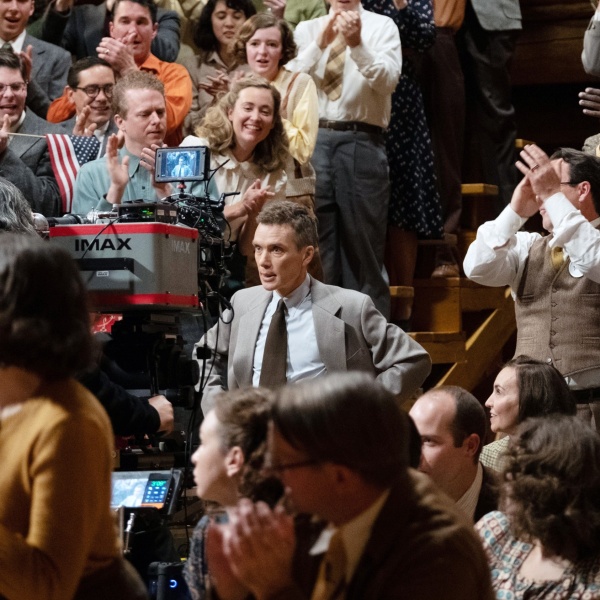In the decades since its 1985 release, director Paul Schrader’s “Mishima: A Life in Four Chapters,” based on the life and work of the prolific Japanese writer Yukio Mishima, has grown in stature to become a revered classic — so much so that during IndieWire’s 80s Week, we ranked it the second best film of the decade, just behind Spike Lee’s “Do the Right Thing.”
For such a celebrated film about one of the most notable Japanese artists of the 20th century, it’s remarkable the film has never been screened in Japan. But according to Schrader, that may change this fall. While taking part in a post-screening Q&A as part of Metrograph’s membership series last month, Schrader broke the news that the Tokyo International Film Festival (October 28 to November 6, 2024) is looking to give “Mishima: A Life in Four Chapters” its Japanese premiere. Schrader elaborated on the complex issues as a guest on an upcoming episode of IndieWire’s Toolkit podcast.
“The festival wants to show it,” said Schrader, “And there are no legal restrictions on them showing it. But there are a lot of unwritten agreements we’re trying to unravel at the moment, but unraveling an unwritten agreement is hard, particularly in Japan.”
“Mishima” was never officially banned from being shown in Japan, but there were verbal agreements that, for all intents and purposes, “unofficially” banned the film. To understand how that came about and why it is hard to untangle, it’s important to understand the difficult circumstances under which Schrader made “Mishima.”
Mishima was not just a celebrated cultural figure; he was well-known for his right-wing ideology and reactionary politics. He was fervent in his belief that Japan had strayed from its traditional culture and politics after World War II, abandoning the sacredness of the Emperor as a result of falling under Western influence after losing the war. As Schrader portrayed in his film, these were beliefs Mishima was ultimately willing to die for in 1970, when he led four members of his personally trained militia onto a Tokyo military base, held its commandant hostage, and tried to inspire the soldiers at the garrison to rise up and overthrow Japan’s 1947 constitution. After his impassioned speech’s inevitable failure, Mishima carried out his plan to commit seppuku at the garrison.
At the time Schrader was making “Mishima: A Life in Four Chapters,” which he shot in Japan at the famed Toho studios, Mishima was an icon of the Japanese right wing.

“The conservative right-wing elements in the country were upset,” said Schrader. “[It was unacceptable to them] that an American, a Gaijin [foreigner in Japan], the enemy of Japan, the subjugator [was] doing [a movie] about a Japanese Nationalist ultra-right hero.”
As word of the project spread, the right-wing put considerable pressure on Toho, which — although it denied it was partially financing it at all — was co-producing the film, to dump the project. According to Schrader, Mishima’s widow, Yoko Hiraoka, even felt pressured to ask for the rights to her late husband’s novels to be returned after she had sold them to Francis Ford Coppola, whose Zoetrope Studios produced the film. In the lead-up to production, things got so heated Schrader was forced to wear a knife-proof vest for protection, and production was in danger of being shut down just as it was starting up.
“Then one day, I was shooting on the Toho lot, and [Zoetrope producer] Tom [Luddy] came up to me and said, ‘It’s all right. We’re gonna be able to make the film,’” said Schrader. “That was the second or third day of shooting, and I took off the [protective] vest.”
While Schrader remained persona non grata on the Toho lot for the remainder of the production (even filmmakers he knew there wouldn’t be seen with him), at the time, neither he nor Luddy was unaware of what had changed and why the right-wing attack dogs had been called off.
“It came out some years later, Tom discovered, that Toho and the conservative faction had made an unwritten agreement that the right-wing would not stop the production if Toho would guarantee to the fact that [the film] would never be shown in Japan, and it has never been,” said Schrader. “And I didn’t understand what it was until sometime later, because we took the film to Cannes and I went to the Toho party and said to Madame [Kazuko] Kawakita, who ran the company, I want to thank you for helping with ‘Mishima.’ And she looked right at me and said, ‘We had nothing to do with that film.’”
Nearly 40 years have passed, all the old players have died off, and according to Schrader, Mishima himself is now seen as “old history,” and not through the same impassioned political lens he once was.
While there is nothing legally restricting the Tokyo International Film Festival from showing the film, verbal agreements are not taken lightly in Japan. According to Schrader, the festival will only show the film if Mishima’s two children don’t object.
“The negotiations are ongoing,” said Schrader. “It’s really kind of tricky because they’re trying to get some sense from the son and daughter whether they would object, and that’s not a question of ‘Oh, they would try to stop it,’ but they have to say they won’t object or agree not to say anything at all.”
Schrader said if “Mishima” does screen at the festival (October 28 to November 6) he would fly out to attend and bring his new film “Oh, Canada,” recently acquired by Kino Lorber, to show alongside it. It’s not a small commitment for the 78-year-old filmmaker, who will be deep into pre-production on his new film at that time. That’s right, “Oh, Canada” — which Schrader, who suffered multiple hospitalizations prior to writing, dubbed his “post-dying film” — won’t be the filmmaker’s last, as it had been billed when he initially shot it.
“Well, it was my last film, but now I’m working on my last, last film,” joked Schrader. “I wrote a script called ‘Non Compos Mentis’ about craziness, and about sexuality, and the crazy things that men do because of romanticism and sexuality. [The title] comes from the Latin phrase for ‘out of mind.’ I have the money for it. We want to start shooting right about Thanksgiving to finish by Christmas.”

Schrader said he is close to casting the two male leads after having an initial setback.
“I was going to do it with Jamie Dornan, and then his manager said, ‘You know, it took us four years to get you out of the sex movie ghetto,’” said Schrader, referencing the Irish actor’s star-making turn as Christian Grey in the “Fifty Shades of Grey” trilogy. “And so he had to drop out. But now I have one actor, and I think this weekend I’ll get the other actor, and we’ll get going.”
Look for IndieWire’s Toolkit episode about “Mishima: A Life in Four Chapters” with Paul Schrader on Spotify, Apple, and other major podcast platforms in September.
Visit Metrograph’s website for more information about their upcoming membership screenings.



